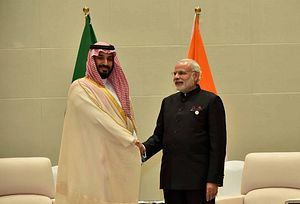On Monday, Saudi Arabia’s crown prince, Mohammad bin Salman (MbS), concluded a two-day official visit to Pakistan. The visit came at a charged moment in South Asia, just four days after an attack near Pulwama in India-administered Jammu and Kashmir was claimed by the Pakistan-based terror group Jaish-e-Mohammed.
The crown prince’s trip had been planned in advance and went ahead after a brief moment of uncertainty and a delay of one day after the attack. In addition to Pakistan, MbS’ trip would take him to India and China, making a three-nation tour of Asia as he seeks to rehabilitate his image on the world stage after his role in directing the murder of journalist Jamal Kashoggi became became widely reported in the final months of 2018.
MbS’ trip to Pakistan largely went off without domestic incident. A meeting between MBS and Pakistani Prime Minister Imran Khan produced a joint statement that affirmed the special relationship between the two countries, which share a long history. As expected, the two sides announced $20 billion in Saudi investment plans for Pakistan and announced several memorandums of understanding for various projects.
“During the high-level discussions between the two sides, they applauded the growing momentum in their bilateral relations in all areas of cooperation, held wide-ranging discussions in a cordial atmosphere and expressed their satisfaction at strengthening the level of leadership communications between the two countries,” the joint statement noted.
On the issue of terrorism, Pakistan managed to score what will appear to India as a significant win. The joint statement saw both sides reiterate a “commitment to continue combating extremism and terrorism.” The statement also noted that both leaders “underlined the need for avoiding politicization of UN listing regime.” That reference takes aim indirectly at the issue of the listing of Masood Azhar, the leader of Jaish-e-Mohammed, as a global terrorist pursuant to United Nations Security Council resolution 1267.
India has long sought Azhar’s listing, but China has opposed the designation. Now, Saudi Arabia’s crown prince—who also holds the portfolios of deputy prime minister and minister of defense—had backed Pakistan on the same issue. For Pakistan, the inclusion of this in the joint statement marked a show of support by an important ally and partner—one that has seen its relationship with India grow in recent years as well.
Complicating matters further, Saudi Foreign Minister Adel al-Jubeir, speaking in Pakistan, said that Riyadh would seek to “deescalate” tensions between the two neighbors. “Our objective is to try to de-escalate tensions between the two countries, neighboring countries, and to see if there is a path forward to resolving those differences peacefully,” he said. That won’t be welcome news to India, which has consistently viewed third country attempts to mediate over Kashmir with skepticism.
MbS’ trip to India, now, will cast the spotlight on the relationship between Delhi and Riyadh. The relationship has accelerated in growth over the past 13 years, beginning with the inflection point in 2006 with the visit of former Saudi King Abdullah to India. In 2010 and 2016, Indian Prime Minister reciprocated with state visits of their own to the kingdom, with Modi making the latter trip. (Modi notably held a sideline bilateral with MbS during the Hangzhou G20 summit meeting in September 2016, too.)
For India, Saudi Arabia is a crucial country in a crucial region—one where India has maintained a diverse portfolio of relationships, often with countries that consider one another rivals. India’s vast appetite for Saudi hydrocarbons has anchored the relationship with a strong transactional nature. MbS’ trip comes as India calibrates its relationship with Iran in the near future as the Trump administration’s renewed sanctions on the regime in Tehran begin to weigh on the country’s oil exports.
But however important Saudi Arabia may be for India and whatever the trajectory of the relationship may have been before this week, MbS’ time in India this week is likely to showcase the fundamental divides that exist between the two sides. Modi, with the political pressures of retaliation for the Pulwama attack weighing heavy weeks before a general election, will face the task of furthering Indian interests with Saudi Arabia while keeping MbS at an arms’ length after his trip to Pakistan.
The Saudi approach to the crown prince’s Asian tour has been to work overtime now to demonstrate that Riyadh’s special relationship with Islamabad is decoupled from its ties with India. In practical terms, that meant MbS flew back to Riyadh after his Pakistan trip on Monday before flying to India for his arrival on Tuesday evening local time.
Let’s see now how MbS’ time in India transpires.

































